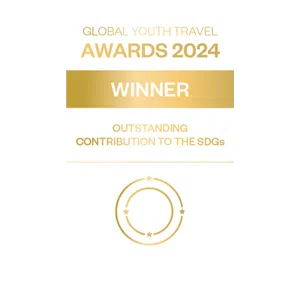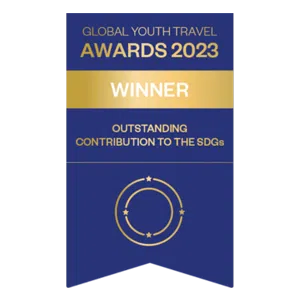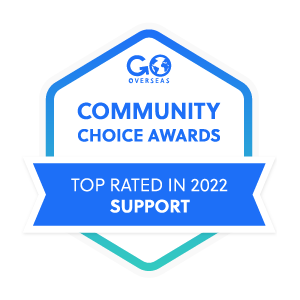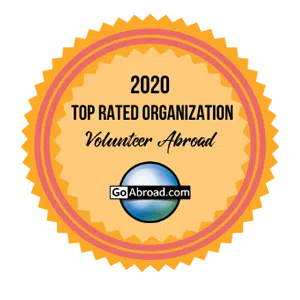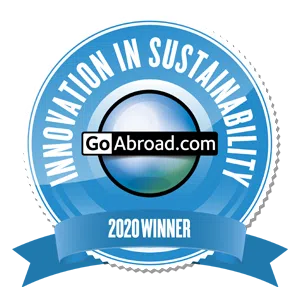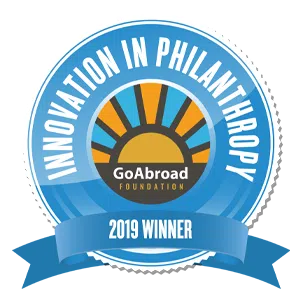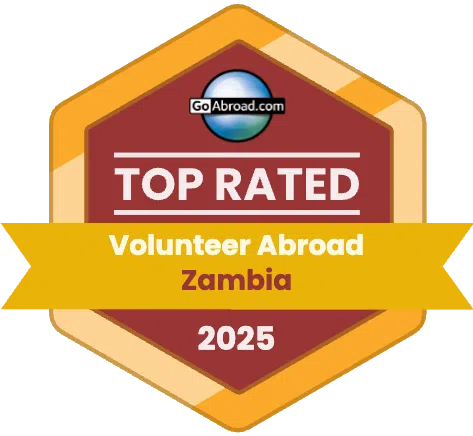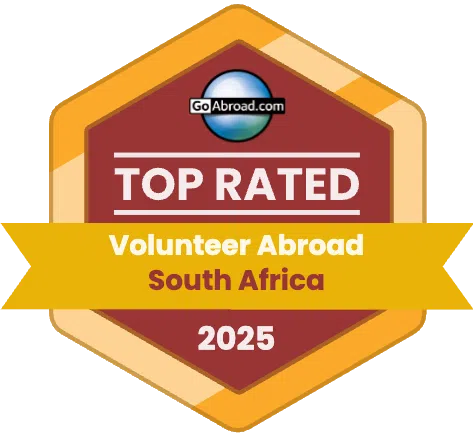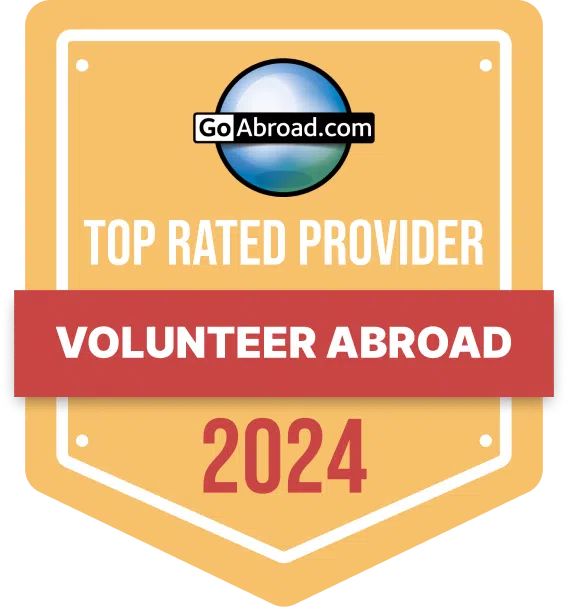From $813
SHARK & MARINE CONSERVATION PROJECT IN SOUTH AFRICA
Assist with Research & Data Tracking on the Ocean's Top Predators
Assist with marine conservation in Gansbaai, South Africa (just two hours from Cape Town), and play a critical role, helping with invaluable work to protect the Dyer Island ecosystem and the marine world off the Cape coast. You’ll work alongside leaders in marine conservation and ecotourism with full-time marine biologists studying the great white shark and other marine species in conjunction with universities and academic institutions worldwide.
From bronze whaler (copper) sharks, sevengill sharks to the very special visits from magnificent great white sharks, the project work includes tagging and tracking, behavioral surveys, wound healing, environmental parameter monitoring as well as daily observational data. This is the perfect project to give people who love the marine environment a chance to immerse themselves in it.
Project Highlights
MARINE BIG FIVE
WORK EXPERIENCE
SHARK BEHAVIOUR
PENGUIN REHABILITATION
SCUBA DIVING
Project Impact Areas
Here’s how you will create significant impact through the Shark Conservation Volunteering Project in South Africa:
Project Destination
Situated almost halfway between Hermanus and Cape Agulhas, lies the fishing town of Gansbaai. It is a unique and popular destination on the Western Cape’s “Whale Coast” known internationally for its dense population of great white sharks and whale-watching opportunities. Located off the coast of Gansbaai, lies Dyer Island, famous for its colony of endangered African penguins. Between July and December southern right whales migrate to the Western Cape of South Africa, increasing your chance of encountering these majestic giants of the ocean.
Life At Base
Accommodation & Meals
Accommodation is at the International Marine Volunteer Centre which has four cottages with a shared sleeping arrangement. Bedding is provided and they are cleaned weekly. All facilities have a mini kitchen, but cooking is done in the central kitchen with adjacent dining room and sitting room. There is a lecture room and work space as well as a pool for volunteers to enjoy.
Start your mornings off right with a selection of breakfast ingredients, and pack a satisfying lunch for your expeditions. After a thrilling boat trip, savor a meal such as a hearty soup and warm bread to replenish your energy. And come evening, delve into the vibrant culinary tapestry of the Cape at one of the many surrounding restaurants, or cook a dinner of your choice with your fellow volunteers at the accommodation facilities!
Communication
South Africa has a few different cellular network providers, for which SIM cards can be purchased from most shops or at the airport. Various package options allow for phone calls and/or data usage. At the accommodation there is free WiFi to enable you to make contact with home.
Flights & Arrivals
Arrive at Cape Town International Airport on the Sunday before your Monday project start date and arrange to stay overnight in Cape Town. From your accommodation, we offer convenient transfers to Gansbaai. Unfortunately transfers from the airport are not available unless booked privately.
Staff
Meet Ettiene Roets, a passionate professional from South Africa, holds a BSc in Environmental and Biological Sciences, specializing in Zoology and Geography. Since 2015, Ettiene has contributed to environmental awareness and conservation initiatives, currently serving as the Volunteer Coordinator at the Marine Dynamics Academy. With technical prowess as a NAUI Open Water certified diver and SAMSA Category C <9m licensed skipper, he manages the volunteer program, scheduling activities, and actively participating in marine conservation efforts. Ettiene’s dedication to education and environmental stewardship shines through, making him a key figure at the Marine Dynamics Academy.
Safety
Our policy is to provide and maintain safe and healthy conditions to all volunteers. Volunteers on this program will be provided with information, training and supervision to ensure safety throughout their stay. The boats and vehicles are maintained to remain in safe conditions, and are equipped with safety features to ensure safety when doing boat activities specific for Shark Cage Diving and Eco-Tours. The project has First Aid supplies and trained First Aid staff in each location, on land and sea.
The team carry radios so that they can communicate with other boats in the area and from sea to land. There is also a contingency plan that would be invoked in the event of any emergency situation.The lodge is equipped with fire safety equipment, evacuation plans and has access to an ambulance service. There are also regular hygiene checks.
Project Gallery
Shark & Marine Conservation Project FAQs
What is the best time of year for sharks?
There are some pros and cons to both seasons: Summer (Dec to Feb) is warm weather but we do struggle with visibility some of the time due to algal blooms in the water. The sharks spend time in the shallows during summer and we can see some big females this time of the year. By winter (June to August) they head out to the islands where they begin hunting more actively on the Cape fur seals of Geyser Rock. We have better visibility then, and believe it or not, slightly warmer water, but we also get some rough winter storms which can keep us off the sea.
What kind of work will I be doing on the boats?
Assisting the crew in the dive operations, helping clients, data recording, observation, getting the boats ready before launch and helping operations when the boats return to land, which includes cleaning of wetsuits and preparing equipment for the next day. Some of the tasks can be quite physical so a healthy degree of fitness is required…. as are sea-legs!
How often will I be cage diving?
On your first day, you will enjoy the cage diving experience as if you were a client so that you understand the experience. Thereafter you will slot in with the duties of the volunteers on board. As space and time allows, the skipper will let you know if you can get in the cage when we are hosting clients. And if we have been really busy and there has not been a chance for volunteers to dive we try to plan an exclusive trip just for the volunteers, again depending on weather/time etc.
Do I need any vaccinations?
The Western Cape of South Africa is a malaria-free area. If you are coming from South America, or travelling in or through any yellow fever zones, you may need to have a Yellow Fever vaccination and certificate. Our Destination Specialists are here to help you!
Do I need to bring any medication?
Please ensure we are advised of any medical condition and if medicine has to be taken on a regular basis. If you are on prescription medicine, please bring your own. We do have a pharmacy in Gansbaai, access to doctors and an on- call ambulance. Our closest hospital is 40 minutes away in Hermanus. Seasickness can affect you for your first few days, so we suggest you bring seasickness tablets, or patches, with you. Tablets should be taken the evening before the dive, and in the morning, before the dive. Please also remember to bring a good sunblock, as the South African sun is very harsh.
Will I see other types of marine life?
Dyer Island is home to breeding colonies of the endangered African penguin and fifteen other seabirds. About 40 000 Cape Fur Seals are resident on Geyser Rock opposite the island and they attract a population of Great White Sharks. The sheltered areas of the bay provide the breeding ground for the Southern Right Whales that migrate here from the sub-Antarctic islands between June to December each year. The area is also visited by Bryde’s and Humpback Whales, as well as various dolphin species – mostly common, Indo-pacific bottlenose and the endangered humpback dolphins. Whale sightings are highly dependent on the time of year that you visit.
How does volunteering on this program benefit Marine Conservation?
As a marine conservation volunteer you play a critical role in helping to protect the Dyer Island ecosystem and the marine world off the Cape coast, for many years to come. You will assist with data collection across the broad fleet of marine research and eco-tourism boats, while gaining experience that can help you further your own interest in the marine environment. Daily observational data is crucial to the scientific research objectives of the marine biologists working in the area. Throughout the operation, it’s important to continually identify gaps in marine conservation knowledge, education and awareness in the area. You will also support the team in various conservation projects, including helping at feeding times at the African Penguin and Seabird Sanctuary.
Our favourite weekend activities in the Gansbaai Area, South Africa
The rugged and unspoilt landscape invites visitors to explore Gansbaai and its surrounds – from the white sands of Pearly Beach to horse riding trails and an array of marine based activities.
Your Enquiry Starts Here
Alumni Network
Return volunteers who book this project in tandem with an African Impact base project get a discount on their African Impact project fee.
Minimum Age
Our minimum age for this volunteer project is 18 years of age if travelling alone, or 16 if travelling with a parent or guardian.
| Duration | Program Fee |
|---|---|
| 1 week | $813 ($813 per week) |
| 2 weeks | $1,331 ($666 per week) |
| 3 weeks | $1,895 ($632 per week) |
| 4 weeks | $2,270 ($568 per week) |
| 5 weeks | $2,756 ($552 per week) |
| 6 weeks | $3,242 ($541 per week) |
| 8 weeks | $4,214 ($527 per week) |
| 10 weeks | $5,176 ($518 per week) |
| 12 weeks | $6,158 ($514 per week) |
| 1 week | £650 (£650 per week) |
| 2 weeks | £1,065 (£533 per week) |
| 3 weeks | £1,516 (£506 per week) |
| 4 weeks | £1,816 (£454 per week) |
| 5 weeks | £2,205 (£441 per week) |
| 6 weeks | £2,593 (£433 per week) |
| 8 weeks | £3,371 (£422 per week) |
| 10 weeks | £4,141 (£415 per week) |
| 12 weeks | £4,926 (£411 per week) |
| 1 week | €748 (€748 per week) |
| 2 weeks | €1,224 (€612 per week) |
| 3 weeks | €1,744 (€582 per week) |
| 4 weeks | €2,088 (€522 per week) |
| 5 weeks | €2,535 (€507 per week) |
| 6 weeks | €2,982 (€497 per week) |
| 8 weeks | €3,877 (€485 per week) |
| 10 weeks | €4,762 (€477 per week) |
| 12 weeks | €5,665 (€473 per week) |
| 1 week | $1,203 ($1,203 per week) |
| 2 weeks | $1,970 ($985 per week) |
| 3 weeks | $2,805 ($935 per week) |
| 4 weeks | $3,359 ($840 per week) |
| 5 weeks | $4,079 ($816 per week) |
| 6 weeks | $4,798 ($800 per week) |
| 8 weeks | $6,236 ($780 per week) |
| 10 weeks | $7,660 ($766 per week) |
| 12 weeks | $9,114 ($760 per week) |
| 1 week | ZAR 14,956 (ZAR 14,956 per week) |
| 2 weeks | ZAR 24,489 (ZAR 12,245 per week) |
| 3 weeks | ZAR 34,877 (ZAR 11,626 per week) |
| 4 weeks | ZAR 41,764 (ZAR 10,441 per week) |
| 5 weeks | ZAR 50,708 (ZAR 10,142 per week) |
| 6 weeks | ZAR 59,649 (ZAR 9,942 per week) |
| 8 weeks | ZAR 77,534 (ZAR 9,692 per week) |
| 10 weeks | ZAR 95,234 (ZAR 9,524 per week) |
| 12 weeks | ZAR 113,304 (ZAR 9,442 per week) |
INCLUSIONS
- Cottage style accommodation with swimming pool
- Breakfast and lunch (Mon - Fri)
- Airport transfers on arrival and departure
- All project transport, equipment and resources
- Support from experienced local and international staff
- Full orientation for responsible project contribution
EXCLUSIONS
- Fights
- Visas
- Insurance
- Weekend tours
- Personal expenses
MINIMUM STAY
The minimum stay for this project is 1 week.
PROJECT FEE INCLUDES
- Cottage style accommodation with swimming pool
- Breakfast and lunch (Mon - Fri)
- Airport transfers on arrival and departure
- All project transport, equipment and resources
- Support from experienced local and international staff
- Full orientation for responsible project contribution
PROJECT FEE EXCLUDES
- Fights
- Visas
- Insurance
- Weekend tours
- Personal expenses
PARTICIPANT REQUIREMENTS
Our minimum age for this volunteer project is 18 years of age if travelling alone, or 16 if travelling with a parent or guardian.
DO YOU NEED SUPPORT?
Our experienced African Impact team is here to support you.
What Is Volunteering?
Volunteering in Africa means travelling with purpose—joining meaningful community or conservation projects, where you pay to cover your stay and project costs, turning your trip into an immersive, impactful experience rather than a traditional holiday.
After completing this enquiry form, one of our Destination Specialists will get in touch to discuss your volunteer experience and any questions you may have.
"*" indicates required fields


























